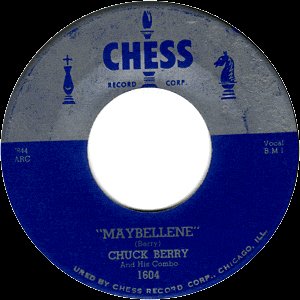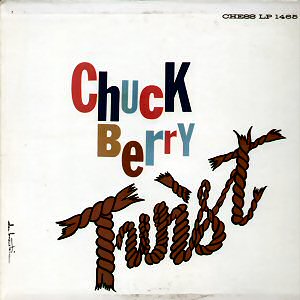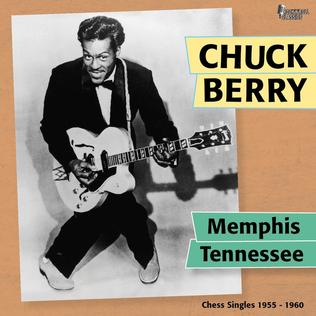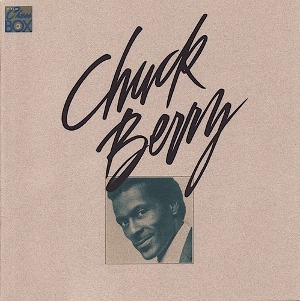
"Rock and Roll Music" is a song by American musician and songwriter Chuck Berry, written and recorded by Berry in May 1957. It has been widely covered and is one of Berry's most popular and enduring compositions.

"Back in the U.S.A." is a song written by Chuck Berry that was released in 1959 and was a top 40 hit. A cover version in 1978 by Linda Ronstadt was also a hit.

"Roll Over Beethoven" is a 1956 song written by Chuck Berry, originally released on Chess Records, with "Drifting Heart" as the B-side. The lyrics of the song mention rock and roll and the desire for rhythm and blues to be as respected as classical music. The song has been covered by many other artists, including the Beatles and the Electric Light Orchestra. Rolling Stone magazine ranked it number 97 on its 2004 list of the "500 Greatest Songs of All Time".

"Maybellene" is a rock and roll song by American artist Chuck Berry, adapted in part from the western swing fiddle tune "Ida Red". Released in 1955, Berry’s song tells the story of a hot rod race and a broken romance, the lyrics describing a man driving a V8 Ford and chasing his unfaithful girlfriend in her Cadillac Coupe DeVille. It was released in July 1955 as a single by Chess Records, of Chicago, Illinois. Berry's first hit, "Maybellene" is considered a pioneering rock and roll song. Rolling Stone magazine wrote of it, "Rock & roll guitar starts here." The record was an early instance of the complete rock and roll package: youthful subject matter; a small, guitar-driven combo; clear diction; and an atmosphere of unrelenting excitement.
"Run Rudolph Run" is a Christmas song written by Chuck Berry but credited to Johnny Marks and M. Brodie due to Marks's trademark on the character of Rudolph the Red-Nosed Reindeer. It was published by St. Nicholas Music (ASCAP) and was first recorded by Berry in 1958, released as a single on Chess Records.
"You Can't Catch Me" is a song written for 1956 musical drama film Rock, Rock, Rock!. It was recorded by Chuck Berry and released as a single in 1956.

Rockin' at the Hops is the fourth studio album by rock and roll pioneer Chuck Berry, released in July 1960 on Chess Records, catalogue LP 1448. With the exception of four tracks, "Down the Road a Piece," "Confessin' the Blues," "Betty Jean," and "Driftin' Blues," all selections had been previously released on 45 rpm singles.

Fresh Berry's [sic] is the ninth studio album by Chuck Berry, released by Chess Records in the United Kingdom in November 1965 and in the United States in April 1966 as an LP record in mono and stereo formats. The US and UK versions of the album have different track listings, "Welcome Back Pretty Baby" is replaced by "Sad Day – Long Night".

Chuck Berry Twist is the first compilation album by Chuck Berry, released by Chess Records in February 1962, during Berry's imprisonment. The title was an attempt to capitalize on a new dance craze, the Twist, introduced by Chubby Checker in 1960, even though none of the songs musically conformed to the Twist style. The album was reissued a year later with a new title, More Chuck Berry. An album with that title was released in the UK by Pye International Records in 1964, featuring the same cover but a completely different track listing.

"Sweet Little Sixteen" is a rock and roll song written and first recorded by Chuck Berry, who released it as a single in January 1958. His performance of it at that year's Newport Jazz Festival was included in the documentary film Jazz on a Summer's Day. It reached number two on the Billboard Hot 100, one of two of Berry's second-highest positions—along with Johnny Rivers cover of "Memphis, Tennessee"—on that chart. "Sweet Little Sixteen" also reached number one on the R&B Best Sellers chart. In the UK, it reached number 16 on the UK Singles Chart. Rolling Stone magazine ranked the song number 272 on its list of the "500 Greatest Songs of All Time" in 2004. He used the same melody on an earlier song, "The Little Girl From Central" recorded on Checkmate in 1955.
"School Days" is a rock-and-roll song written and recorded by Chuck Berry and released by Chess Records as a single in March 1957 and on the LP After School Session two months later. It is one of his best-known songs and is often considered a rock-and-roll anthem.

"Memphis, Tennessee", sometimes shortened to "Memphis", is a song by Chuck Berry, first released in 1959. In the UK, the song charted at number 6 in 1963; at the same time Decca Records issued a cover version in the UK by Dave Berry and the Cruisers, which also became a UK Top 20 hit single. Johnny Rivers's version of the song was a number two US hit in 1964.
"Too Much Monkey Business" is a song written and recorded by Chuck Berry, released by Chess Records in September 1956 as his fifth single. It was also released as the third track on his first solo LP, After School Session, in May 1957; and as an EP. The single reached number four on Billboard magazine's Most Played R&B In Juke Boxes chart, number 11 on the Most Played R&B by Jockeys chart and number seven on the R&B Top Sellers in Stores chart in the fall of 1956.

Chuck Berry's Golden Decade is a compilation of music by Chuck Berry, released in three volumes in 1967, 1973, and 1974. Covering the decade from 1955 to 1964, each volume consists of a two-LP set of 24 songs recorded by Berry. The first volume reached number 72 on Billboard's Pop Albums chart. The second volume peaked at number 110. The third volume, which included only two hit singles among its tracks, did not chart.
"Brown Eyed Handsome Man" is a rock and roll song written and recorded by Chuck Berry, originally released by Chess Records in September 1956 as the B-side of "Too Much Monkey Business." It was also included on Berry's 1957 debut album, After School Session. The song title was also used as the title of a biography of Berry.

American rock and roll musician Chuck Berry's discography includes 20 studio albums, 12 live albums, 31 compilation albums, 50 singles, 8 EPs, and 2 soundtrack albums.

The Chess Box is a compact disc box set compilation by Chuck Berry. It is one in a series of box sets issued by MCA/Chess in the late 1980s. The Chuck Berry set is the most prominent of these, having won a Grammy Award for Best Historical Album in 1989. Berry's Chess Box was reissued on vinyl in 1990.
"Carol" is a song written and recorded by Chuck Berry, first released by Chess Records in 1958, with "Hey Pedro" as the B-side. The single reached number 18 on Billboard's Hot 100 and number 9 on the magazine's R&B chart. In 1959, it was included on his first compilation album, Berry Is on Top.
"Wee Wee Hours" is a song written and recorded by Chuck Berry in 1955. Originally released as the B-side of his first single, "Maybellene", it went on to become a hit, reaching number 10 in the Billboard R&B chart.

"Little Queenie" is a song written and recorded by Chuck Berry. Released in March 1959 as a double A-side single with "Almost Grown", it was included on Berry Is on Top (1959), Berry's first compilation album. He performed the song in the movies Go, Johnny Go! (1959) and Hail! Hail! Rock 'n' Roll (1987). One year earlier, Berry had released "Run Rudolph Run", a Christmas song with the same melody.












